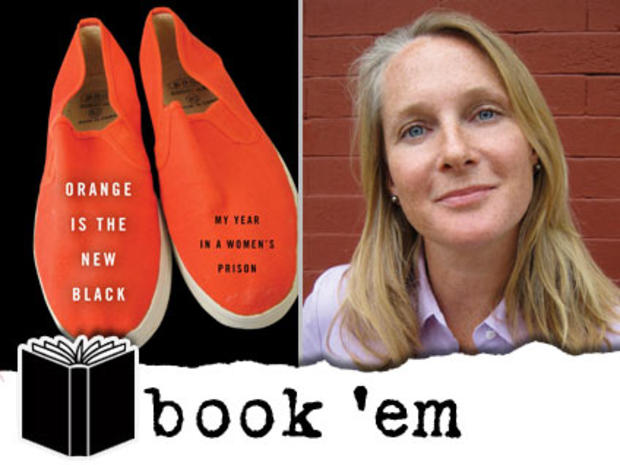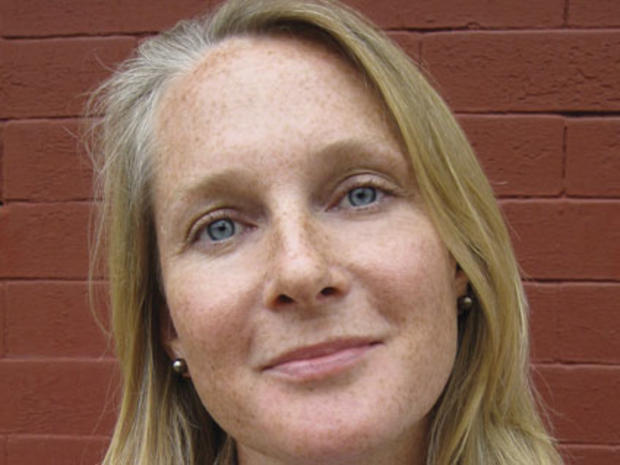Book 'Em: Orange Is The New Black
NEW YORK (CBS) When Piper Kerman was sent to prison for a ten-year-old crime, she barely resembled the reckless young woman who, shortly after graduating Smith College in 1992, had committed the misdeeds that would eventually catch up with her. Happily ensconced in a New York City apartment, with a promising career and an attentive boyfriend, she never expected that knock on the door: "Miss Kerman? It's officers Maloney and Wong."
She was suddenly forced to reckon with the consequences of her very brief, very careless dalliance in the world of drug trafficking.
Kerman spent thirteen months in prison, eleven of them at the infamous federal correctional facility in Danbury, Connecticut, where she met a surprising and varied community of women living under exceptional circumstances. In Orange Is The New Black, Kerman tells the story of those long months locked up in a place with its own codes of behavior and arbitrary hierarchies, where a practical joke is as common as an unprovoked fight, and where the uneasy relationship between prisoner and jailer is constantly and unpredictably recalibrated.
Her memoir of her year in prison offers a unique perspective on the criminal justice system, the reasons we send so many people to prison, and what happens to them when they're there.
Interview with Piper Kerman by Barry Leibowitz, Senior Writer at 48 Hours | Mystery
Was your conviction deserved, and was your sentence fair?
Kerman: My conviction was deserved because I committed the offense and certainly understood it was illegal; I pleaded guilty, as do about 90% of criminal defendants.
On my first day in prison, I found myself side by side with women who were serving sentences of 5 years, 10 years, and longer, as compared to my 15-month sentence. As I came to know these women well, I often asked myself whether it was possible that their offenses were so much worse than mine. The conclusion I reached was "No": the difference was that they were from poor communities and could not afford high quality private legal representation, often had skin that was a different color than mine, and were perhaps not as able to represent themselves as people to prosecutors and judges.
Given that, it's awfully hard to complain about my sentence being unfair.
Should people have sympathy for you?
Kerman: I'm not particularly interested in sympathy. I'm much more interested in empathy; lack of empathy lies at the heart of every crime, and the ability to confront and take responsibility for the harm one has done to others is what allows people to change.
Unfortunately, there's nothing about our prison system or the way sentences are structured that addresses this: prisoners are removed from the community, warehoused, and then dumped back into the community. It's very rare that prisoners actually contend with the harm they have caused directly, whether to an individual or to their community, either because the person happens to be reflective or because they take place in one of the rare restorative justice programs.
In the book I set out to describe the experience of being a prisoner for a year as accurately and honestly as I could; I hope that when people read it they can begin to imagine what their life would be like if they had to go to prison.
What surprised you the most about prison life?
Kerman: The community of women I was a part of as a prisoner was endlessly fascinating and surprising, by far the most diverse group of people I've ever lived among: very young and very old, and every race, creed and class was there. I lived among an incredible spectrum of personalities, from elderly Roman Catholic nuns (political prisoners) to my transsexual neighbor, from sprinklings of stockbrokers to gals from the 'hood. While I certainly didn't like everyone I met while incarcerated, other prisoners were the saving grace of the experience, and that's not something one expects when going to prison.
What lessons did you learn about yourself in prison that you couldn't have learned anywhere else?
Kerman: I think the only lesson the prison system teaches is how to be a prisoner; very necessary for one's survival behind prison walls. Not very useful when it comes time to go back to being a citizen.
The lessons I value are what I learned from other prisoners: how important small kindnesses are in desperate circumstances; how the things two people have in common are much more important than their obvious differences; and how my own actions more than a decade before related to the other women's lives, many of which had been devastated by substance abuse and addiction.
If you could change just one thing about the prison system, what would it be?
Kerman: I would send far fewer nonviolent offenders to prison in the first place. In 1980 there were about 500,000 prisoners in the U.S. Now we have about 2.3 million which is the highest incarceration rate in the world (with many more Americans on probation and parole), and we spend around $70 billion dollars a year on "corrections" alone - and prison systems are bankrupting states like California. But our prison system has a 2/3 failure rate - more than half of the people we lock up end up back in prison, because nothing is happening behind bars that makes it possible for them to change their paths.
I would greatly strengthen probation and parole systems, so that more people who commit low-level crimes can serve their sentence in the community. This kind of sentencing reform would cost taxpayers less, and also give more realistic opportunity for "second chances" which create a real pathway out of the cycle of incarceration. There are programs like Project HOPE in Hawaii that have done this with great success, and states like Michigan have succeeded in reducing their prison population without sacrificing public safety, with places like South Carolina changing their laws in hopes of following their lead.
About the Author
Piper Kerman is a vice president for a Washington, D.C.-based communications firm that works with foundations and nonprofits. A graduate of Smith College, she lives in Brooklyn with her husband.

